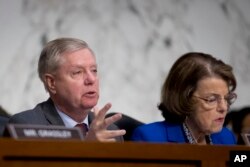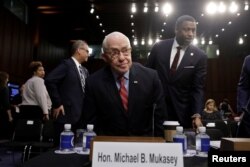A Senate panel's partisan divide came into focus regarding U.S. President Donald Trump's pick for attorney general, William Barr, who was lauded and sharply criticized Wednesday by a panel of legal experts, civil rights leaders and other witnesses on Capitol Hill.
The Senate Judiciary Committee's top Democrat, Dianne Feinstein of California, expressed lingering doubts about Barr's commitment to making public Special Counsel Robert Mueller's forthcoming report on contacts between Trump's inner circle and Russia, as well as Moscow's interference in the 2016 presidential contest.
"I think it's essential that Congress and the American people know what is in the Mueller report," Feinstein said. "I am hopeful that that report will be made public, and my vote [on Barr's nomination] depends on that."
By contrast, the committee's chairman, South Carolina Republican Lindsey Graham, had nothing but praise for the nominee, whose long legal resume includes a previous stint as attorney general during the George H.W. Bush administration.
"I just can't think of a better person to pick than Mr. Barr," Graham said. "I don't know who is going to do better than him in terms of experience, judgment, and temperament. If this guy doesn't cut it, I'm at a loss of who we can pick."
Testifying before the panel Tuesday, Barr said the Russia probe should be completed and its results made known to the public and to Congress. He also took issue with Trump's labeling the investigation of his inner circle's contacts with Moscow as a "witch hunt."
"I don't believe [special counsel Robert] Mueller would be involved in a witch hunt," Barr said, adding that the special counsel could only be terminated for good cause and that "it's unimaginable" Mueller would "ever do anything that gave rise to good cause."
Democrats and some Republicans have long feared that Trump intends to shut down the Russia probe, which Barr would oversee if confirmed as America's top law enforcement official.
Wednesday's panel provided sharply differing views of Barr and whether he should return to the Justice Department.
"I don't know of any nominee who has had his background and his credentials for this job," Michael Mukasey, who served as attorney general during the George W. Bush administration, said. "He has done literally everything that you could possibly do, including serving as attorney general, to prepare him. He's an honorable, decent, smart man."
Civil rights leaders, meanwhile, expressed alarm.
"For the past two years, the Justice Department has been led by an attorney general [Jeff Sessions] intent on restricting civil and human rights at every turn," National Urban League CEO Marc Morial said. "This nation needs an attorney general who will dramatically change course and enforce civil rights laws with vigor and independence."
Morial added, "Based on his alarming record, we are convinced that William Barr will not do so. It's clear that Mr. Barr intends to follow Mr. Sessions down the same regressive, anti-civil rights road map."
Legal scholars disagreed on how Barr's expansive view of executive authority would inform his decisions as attorney general.
"Mr. Barr's theory of presidential power is fundamentally inconsistent with our Constitution and deeply dangerous for our nation," Georgia State University law professor Neil Kinkopf warned.
"The attorney general appears on behalf of the constitution, not the president. I know that Bill Barr understands that distinction," George Washington University law professor Jonathan Turley said. "He has maintained that position through his whole career. He's a law nerd. I should know, because I'm a law nerd."
One witness came with a simple plea regarding gun violence in America. Three relatives of Reverend Sharon Risher were slain in the 2015 church shooting in Charleston, South Carolina, that claimed the lives of nine worshipers.
"I hope he [Barr] will make it a priority to prevent gun violence and work with Congress to update our laws and close loopholes that enable guns to get in the wrong hands," Risher said.
Barr's confirmation is considered likely by the Senate, where Republicans hold a 53-47 majority.
VOA's Masood Farivar and Wayne Lee contributed to this report.











